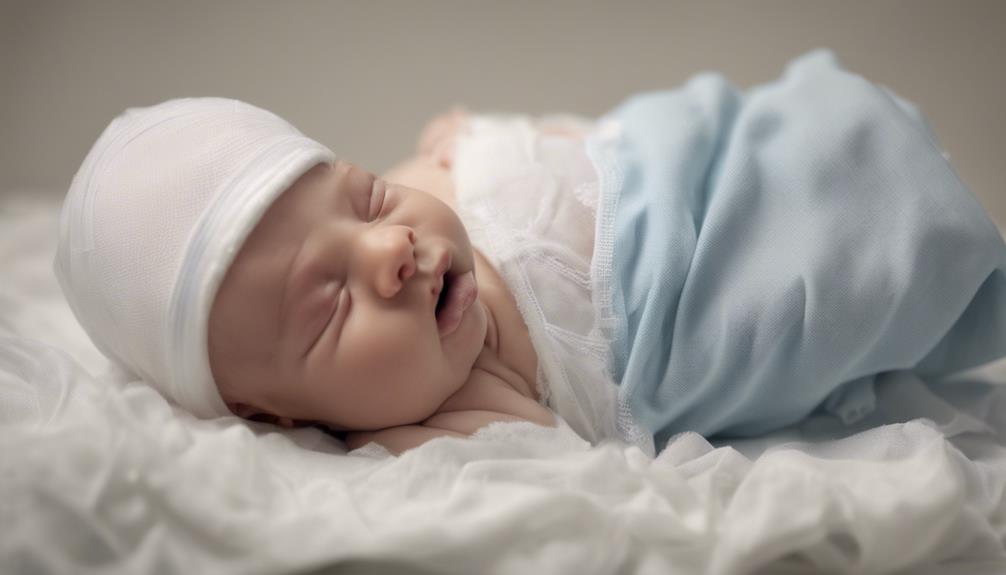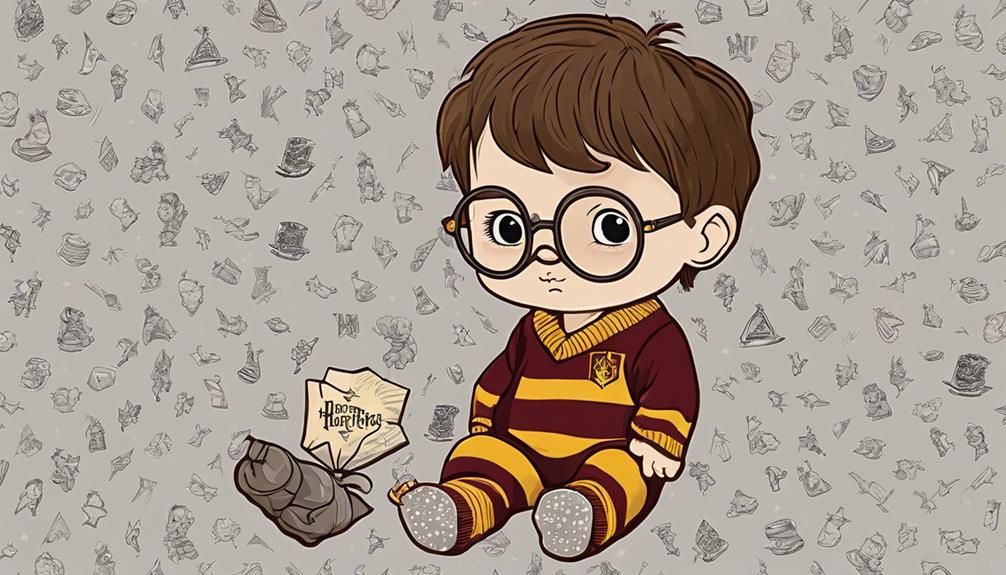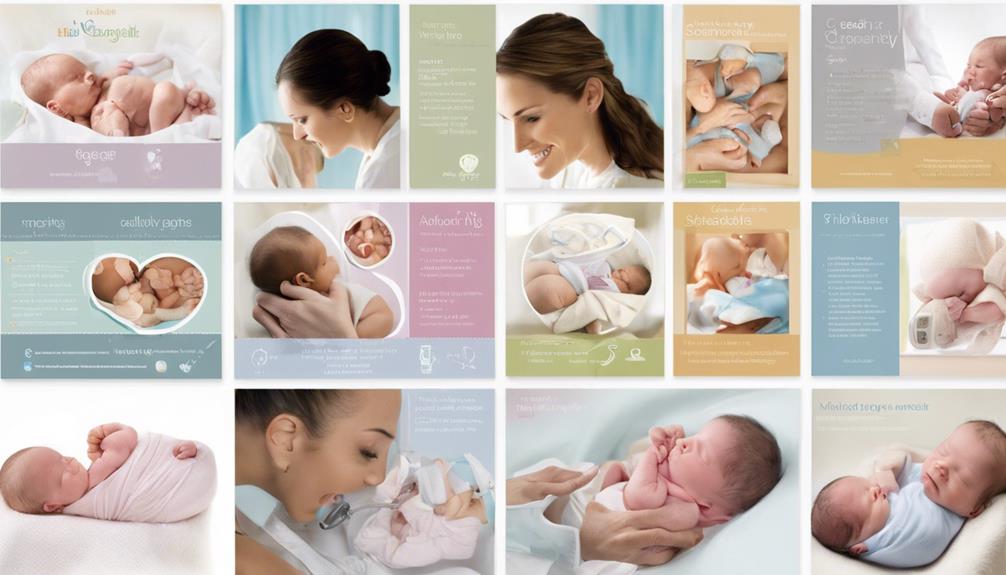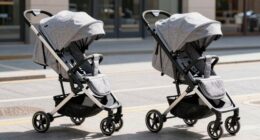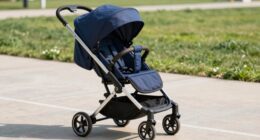When it comes to soothing your newborn's hiccups, steering through the gentle waters of remedies can be a calming journey for both you and your little one.
But what if those persistent hiccups seem to linger longer than expected, despite your best efforts to ease them?
Let's explore practical and tender ways to help your newborn find relief and restore peace to your feeding sessions.
Key Takeaways
- Burping after feeding helps release trapped air causing hiccups
- Offering a pacifier relaxes the diaphragm, potentially stopping hiccups
- Gentle back rubs soothe and relax the diaphragm, relieving hiccups
- Avoid harmful adult remedies like breath-holding or sudden scares
Natural Remedies for Newborn Hiccups
When your newborn experiences hiccups, natural remedies such as burping after feeding and offering a pacifier can help alleviate the discomfort. Newborn hiccups often occur due to trapped air in their tiny tummies. By burping your baby after each feeding, you can release any trapped air bubbles that may be causing the hiccups. Offering a pacifier to suck on can also relax the diaphragm and potentially stop the hiccups. Changing your baby's position, like holding them upright against your shoulder, can aid in relieving hiccups by allowing the air to escape more easily.
Additionally, gentle back rubbing in a circular motion can help to soothe your little one and assist in releasing any trapped air contributing to the hiccups. It's important to avoid adult remedies like startling your baby or attempting to make them hold their breath, as these methods aren't only ineffective but can also cause distress. Stick to these gentle ways and natural remedies to help ease your newborn's hiccups effectively.
Techniques to Relieve Newborn Hiccups

To alleviate your newborn's hiccups, employing gentle techniques like burping after feeding and offering a pacifier can effectively help release trapped air and relax their diaphragm. Changing your baby's position, such as holding them upright, may also aid in relieving hiccups. Additionally, gently rubbing your baby's back can help alleviate hiccups by releasing trapped air bubbles. It's important to remember that adult remedies like holding your breath or breathing into a bag should be avoided when trying to stop newborn hiccups.
To further highlight the techniques mentioned above, let's take a look at the table below:
| Technique | Description | Benefit |
|---|---|---|
| Burping | After feeding, pat your baby's back gently to burp | Releases trapped air causing hiccups |
| Pacifier | Offer a pacifier to help relax the diaphragm | May stop hiccups in newborns |
| Position Change | Hold your baby upright to aid in relieving hiccups | Assists in releasing trapped air |
| Rubbing | Gently rub your baby's back to release air bubbles | Helps alleviate hiccups |
Soothing Methods for Newborn Hiccups

If your newborn is experiencing hiccups, making sure your baby is in an upright position during feeding and avoiding overfeeding can help alleviate the discomfort caused by trapped air bubbles.
When your baby has hiccups, you can gently pat or rub their back to help release the trapped air that might be causing the hiccups. Offering a pacifier for them to suck on can also relax their diaphragm and potentially stop the hiccups.
It's important to allow the hiccups to resolve naturally within 5 to 10 minutes, as this is usually effective and harmless for newborns.
To help prevent hiccups, making sure your baby is in an upright position during feeding and avoiding overfeeding can be beneficial. Creating a calm feeding environment can also contribute to preventing hiccups.
Gentle Approaches for Newborn Hiccups

Burping your baby after feeding is a gentle approach that can help release trapped air and alleviate hiccups. When your newborn experiences hiccups, you may try the following gentle methods to help soothe them:
- Use a Pacifier: Offering a pacifier can help relax the diaphragm of your baby, which may stop the hiccups in newborns.
- Gentle Belly Rubs: Lightly rubbing your baby's belly in a clockwise motion can aid in digestion and alleviate hiccups.
- Back Patting: Gently patting your baby's back while holding them upright can assist in releasing trapped air and reducing hiccups.
- Allow Natural Stop: Allowing hiccups to subside naturally within 5 to 10 minutes is usually safe and effective, as it gives your baby's body time to regulate itself.
Effective Ways to Cure Newborn Hiccups

When your newborn is experiencing hiccups, employing gentle techniques can effectively help in alleviating this common issue.
Burping your baby after feeding is a simple yet vital step in releasing trapped air that could be causing the hiccups.
Offering a pacifier can help relax the diaphragm, potentially stopping the hiccups in their tracks.
Sometimes, a change in position can work wonders; try holding your baby upright to aid in stopping the hiccups.
Gentle back rubs can also be soothing for your little one and may help relax the diaphragm, relieving the hiccups.
Remember to avoid using adult remedies such as having your baby hold their breath or sudden scares to cure newborn hiccups, as these can be harmful.
Frequently Asked Questions
How Can I Soothe My Newborn's Hiccups?
To soothe your newborn's hiccups, try burping after feedings, offering a pacifier for comfort, gently rubbing their back, or holding them upright. Let hiccups resolve naturally in 5-10 minutes. Avoid gripe water due to limited evidence of effectiveness.
Is It OK to Lay Baby Down With Hiccups?
It's generally safe to lay your baby down with hiccups. Hiccups are harmless and usually resolve on their own. If your baby seems uncomfortable, try holding them upright or gently patting their back.
What Is the Best Position for Baby Hiccups?
To help ease your baby's hiccups, hold them upright on your shoulder, sit them up, or lean them against your chest. Keep them upright after feeding, place them on their tummy while patting gently, and avoid laying them flat immediately post-feeding.
Do Hiccups Mean Baby Is Full?
Hiccups in a baby don't always mean they're full; various factors can trigger them. Remember, hiccups are normal and not just about feeding. Stay calm, offer comfort, and focus on soothing your little one.
Conclusion
To sum up, remember that newborn hiccups are a common and harmless occurrence that usually resolve on their own.
By using gentle methods like burping, offering a pacifier, and creating a calm feeding environment, you can effectively manage and prevent hiccups in your baby.
Despite their persistence, rest assured that with patience and care, your little one will outgrow this phase.
Trust your instincts as a parent and seek medical advice if needed. Your baby's well-being is always a top priority.


